Jordan Spieth's FedEx Cup win confirms exciting new era
- Published
- comments
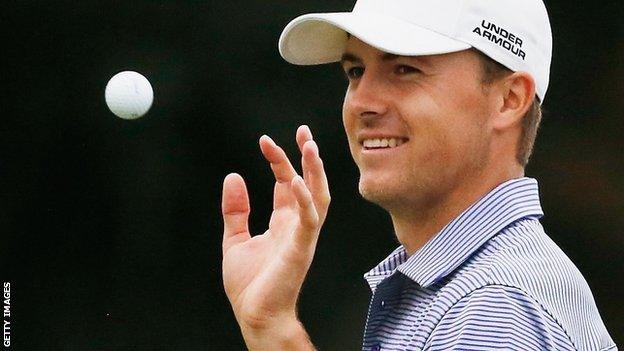
Jordan Spieth won the Masters and US Open in 2015
Jordan Spieth's Tour Championship triumph was the ideal exclamation mark to conclude a PGA Tour season that shows golf has moved into a new and exciting era.
And while this offers a very encouraging outlook, there are massive challenges for the European Tour to have any chance of capitalising as well as their American counterparts.
The lucrative play-offs were dominated by Jason Day and then Spieth. The series provided the perfect send-off to a stellar season.
These two players were the most prominent stars in the majors before fighting it out over the last month of the season. World number one status was also on the line.
This is surely the intoxicating scenario envisaged when the play-offs were launched eight years ago.
Spieth's victory at East Lake on Sunday capped a series more meaningful than a grubby dash for a $10m bonus.
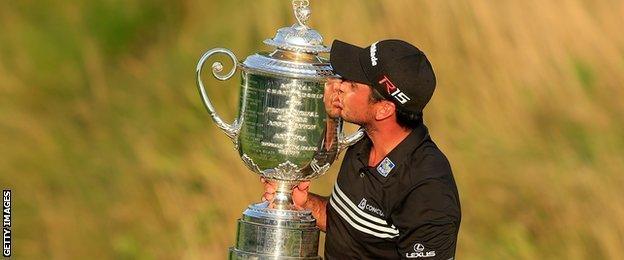
Jason Day became the fifth Australian to win the US PGA Championship
US PGA champion Day won two of the four season-ending tournaments to temporarily knock Spieth from the top of the world rankings. Then the Texan responded brilliantly to win the finale in Atlanta.
The victory took his season's earnings to more than $22m and returned the 22-year-old to his rightful position of world number one.
By claiming the Tour Championship, Spieth matched Australian Day with five victories in a season. Two of them, the Masters and US Open, were the young Texan's first major championships.
So between them, Spieth and Day, 27, claimed 10 wins, three of them majors. They were both only one shot shy of the play-off that decided Zach Johnson's Open at St Andrews.
World golf rankings as of 28 September 2015 | ||
|---|---|---|
Rank | Name | Country |
1 | Jordan Spieth (22) | United States |
2 | Jason Day (27) | Australia |
3 | Rory McIlroy (26) | Northern Ireland |
4 | Bubba Watson (36) | United States |
5 | Rickie Fowler (26) | United States |
Average age: 27.4 years | ||
This is what golf needs - familiar, young and dominant players occupying leaderboards, week in, week out, and especially when the biggest prizes are up for grabs.
We should also believe that Rory McIlroy, the 26-year-old who was top of the rankings until August, would also have been a big part of this conversation had he not suffered his freak ankle injury in July.
It ruined the heart of his season, just as Spieth and Day were motoring. But the Northern Irishman, with four major wins already to his name, is talented and driven enough to ensure he is part of this new "big-three" era.
"We push each other," Spieth said. "When we recognise what these other guys are doing and the potential runs that they can go on, it really does push us because none of us want to lose to the other. We all want to beat the crud out of each other."
Spieth v Day in 2015 | ||
|---|---|---|
Jordan Spieth | Jason Day | |
£7,921,398.20 | 2015 earnings | £6,191,961.91 |
26 | PGA events entered | 21 |
92 | Rounds | 76 |
22 | Cuts made | 19 |
16 | Top 10 finishes | 12 |
6 | Wins | 5 |
2 | Majors | 1 |
And they do it in a right and well-mannered way, commensurate with the mutual respect each feels for the other. The fact that all three represent different parts of the world adds another enticing dimension.
But how Europe gains its share of a global age that promises so much is another question.
Indeed, it provides the biggest challenge for new European Tour chief executive Keith Pelley as he settles behind his Wentworth desk.
Already he has found an "exceptional circumstances" clause to enable McIlroy to compete in the Race to Dubai finale despite not completing the required quota of 13 tournaments.
It is a precedent that may have implications for the future but the Canadian boss had little alternative. He needs McIlroy at the tour's season-ending events.
More worryingly the lure of the Ryder Cup, which has always been the Tour's trump card, is showing worrying signs of perhaps being on the wane.
If you're not a member of the European Tour you aren't eligible for golf's biggest showpiece event.
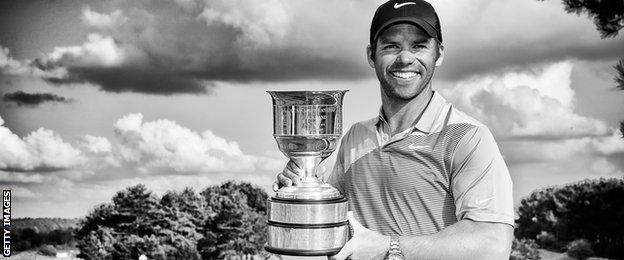
Cheltenham-born Paul Casey took a golf scholarship at Arizona State University and turned professional in 2000
However, the attraction of playing the biennial match against the Americans cannot be taken for granted. Englishman Paul Casey is an example of how attitudes could change.
This week Pelley is expected to meet Casey, who has played on two winning teams in his three Ryder Cups, and the player is seemingly reluctant to make a fourth appearance his top priority.
Since resigning from the European Tour last year, Casey has rebuilt his career to climb from 75th to 23rd in the world rankings.
He is now the seventh-highest ranked European and, on current form, European captain Darren Clarke would love to have him in his side for Hazeltine a year from now.
Yet everything Casey is saying indicates that he is more than happy to remain Stateside and not be hampered by the transatlantic schedules of contemporaries like McIlroy.
"I love the European Tour and I'd like to be part of a better tour, but I want to see change. I'm really not sure I'm going to rejoin," Casey told the Daily Mail, external last week.
"I've been able to work much harder on my game because I've cut down on the travelling and I've got the rewards," the 38-year-old added. "Do I want to change all that next season?
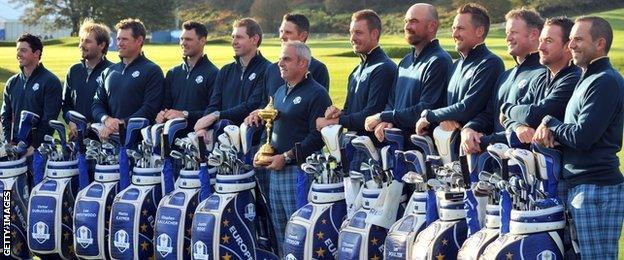
Rory McIlroy, Sergio Garcia and Justin Rose were all part of Paul McGinley's victorious Ryder Cup team in 2014
"I'd do it tomorrow if they dropped the quota of 13 events to 11, but is that going to happen?"
Pelley knows such a policy would lead to tournaments on his circuit suffering from a further loss of big names.
It's an awkward and sensitive situation, one that will need imaginative management because if others follow Casey's likely route, the European Tour would be badly damaged.
It can currently survive without Paul Casey, Sweden's David Lingmerth and Scotland's Russell Knox - all US-based Europeans. But losing members like McIlroy, Sergio Garcia, Justin Rose and Henrik Stenson would be a massive blow.
The fact that 2016 captain Clarke would be left unable to assemble Europe's strongest Ryder Cup team would be the least of the tour's problems.
Yes, these are exciting times for golf. As Spieth says: "I think it's in as great a state as it's been in a while."
But for a European Tour already planning closer ties with their Asian counterparts, there are immense challenges to be met to cash in on such an exciting period for the game.
- Published28 September 2015
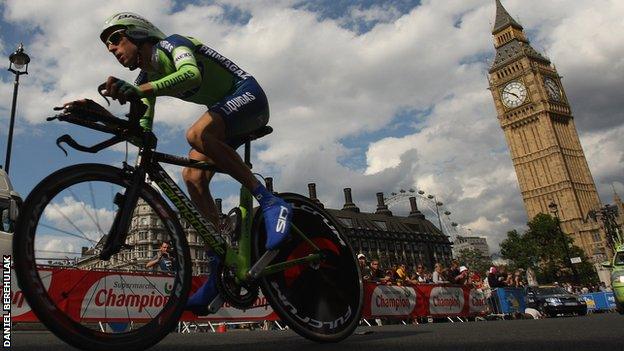
- Published28 September 2015
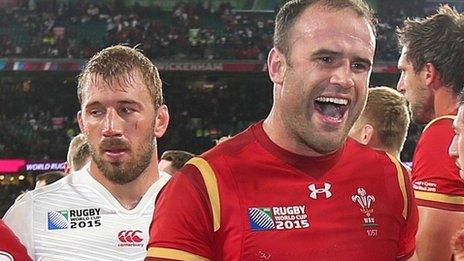
- Published28 September 2015
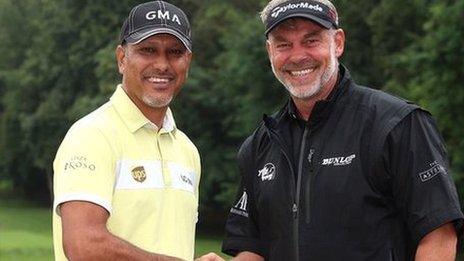
- Published27 September 2015
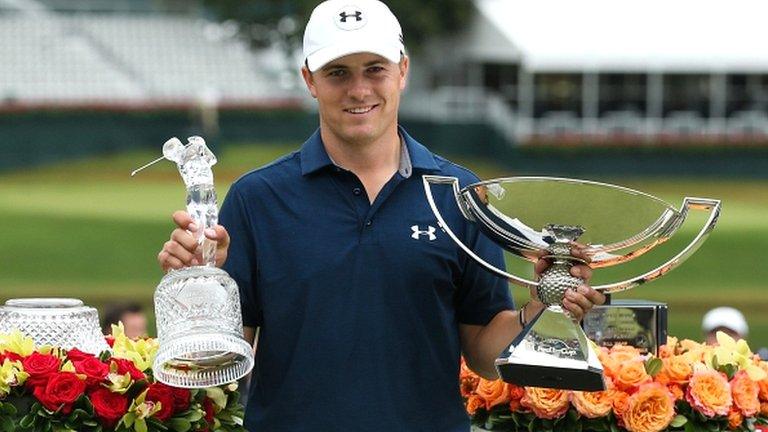
- Published27 September 2015

- Published28 September 2018
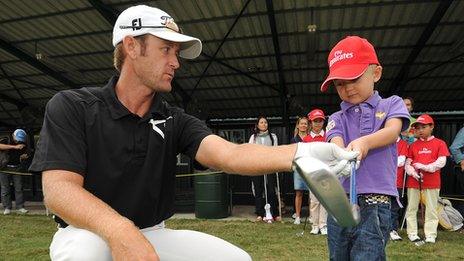
- Published19 July 2016
